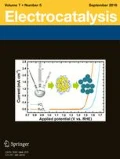I welcome you to this special issue of Electrocatalysis entitled “Electrocatalysis in South Africa.” This special issue primarily contains selected papers from the 4th International Symposium on Electrochemistry organised by ElectrochemSA—The Electrochemistry Division of the South African Chemical Institute (SACI). Electrochemistry, though traditionally a subset of physical chemistry and analytical chemistry, in recent times has emerged to be a notable branch of chemistry. Electrochemistry is applied in heterogeneous catalysis, energy generation and storage, biochemistry, materials science, biotechnology, nanotechnology, engineering, mining, environmental science, water treatment technologies, biomedicine, and so on. It is a key science behind many technologies such as sensors, biosensors, solar cells, batteries, capacitors, supercapacitors, fuel cells, hydrogen storage, water splitting, electroplating, corrosion, and many “green” water treatment processes such as photoelectrochemical oxidation and electrocoagulation, among others.
At the heart of all these applications is Electrocatalysis, which is a catalytic process involving oxidation and reduction reactions through the direct transfer of electrons, which requires electrocatalysts. In another word, Electrocatalysis is a type of catalysis that results in the modification of the rate of an electrochemical reaction occurring on an electrode surface.
South Africa (SA) and Africa at large are delighted to be honoured with a Special Issue of the journal Electrocatalysis. Electrochemistry is a very material-dependent science and technology and thus Africa has the potential of being a prominent global player owing to the abundance of mineral resources which are needed in electrode and cell designs. Some African countries are known to have globally significant deposits of natural resources. For example, Republic of the Niger (uranium, coal, cement, and gold), Namibia (uranium, diamonds, zinc, lead, sulphur, salt, tantalite, and copper), Democratic Republic of Congo (copper, cobalt, diamond, oil, gold, and tin), Zambia (copper, emerald, and cobalt), Mozambique (aluminium), Ghana (gold, diamond, bauxite), and Nigeria (petroleum). South Africa stands out in Africa owing to its very rich mineral resources and advancement in science and technology. It is well known that South Africa is the world’s largest producer or among the world’s largest producer of platinum group metals, manganese, vanadium, palladium, rutile, etc. South Africa has been a leader in catalysis over the years. Some examples include the production of catalytic converters for automobiles, Fischer-Tropsch systems for coal/gas to crude oil etc. South Africa, owing to mining strength, is a global player and an African hub in electrochemical processes such copper refining. In the field of electrochemistry, battery research has been flourishing in South Africa with its huge manganese deposit; the country is well positioned for the production of Li-ion batteries.
This special issue of Electrocatalysis is a compendium of papers across the electrochemistry from material electrochemistry, semiconductor electrochemistry, fuel cell, alcohol oxidation, enzymatic electrocatalysis, sensors, liquid | liquid ion transfer voltammetry on organogels, novel materials for oxygen evolution reactions, and photoelectrocatalysis for water treatment and sensors.
Enjoy your read and we look forward to feedbacks and collaboration from the rest of the world.
Author information
Authors and Affiliations
Corresponding author
Additional information
Publisher’s Note
Springer Nature remains neutral with regard to jurisdictional claims in published maps and institutional affiliations.
Rights and permissions
About this article
Cite this article
Arotiba, O.A. Welcome for the Special Issue “Electrocatalysis in South Africa”. Electrocatalysis 10, 287 (2019). https://doi.org/10.1007/s12678-019-00545-2
Published:
Issue Date:
DOI: https://doi.org/10.1007/s12678-019-00545-2

